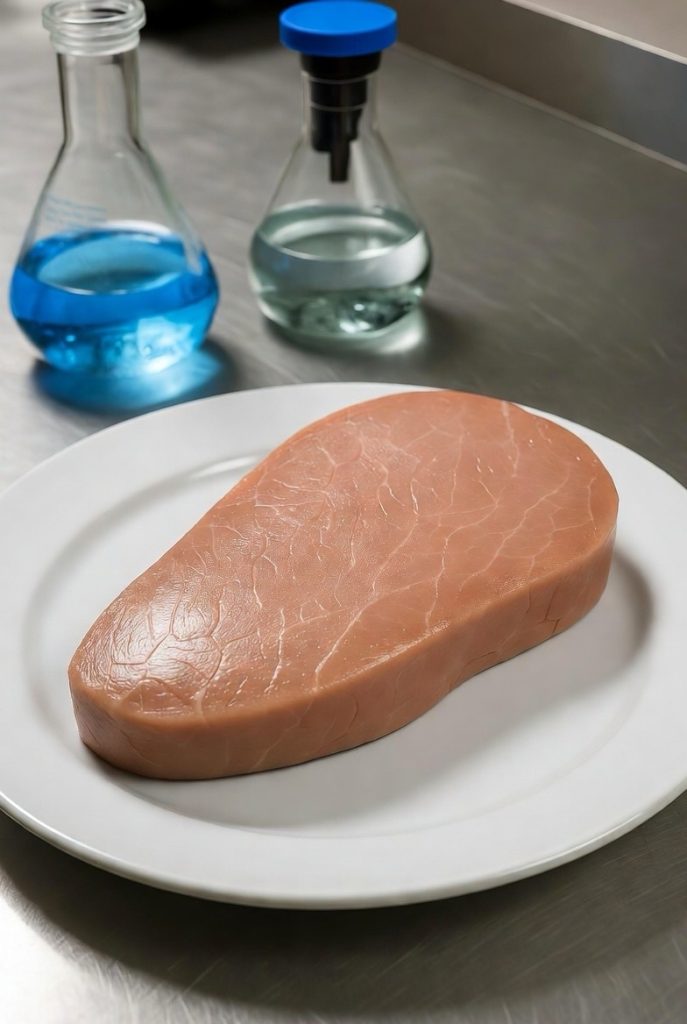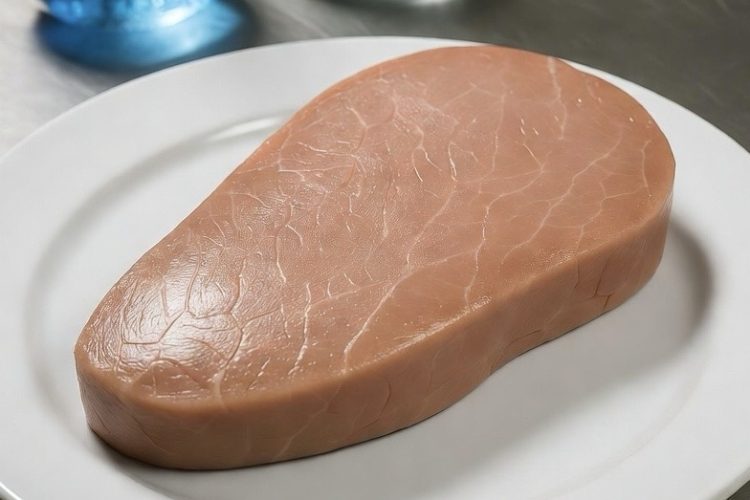Lab-grown meat, also called cultivated or cell-cultured meat, is facing bans in seven U.S. states, including Texas, where Senate Bill 261 blocks its sale starting September 2025. Upside Foods and Wildtype Inc. sued Texas in federal court on September 2, 2025, claiming the ban violates the Commerce Clause and protects local ranchers unfairly. Their products have FDA and USDA approval. Critics fear contamination from bioreactors, immortalized cells, and ultra-processing, while supporters say it cuts pathogens like E. coli and Salmonella compared to factory farming. Traditional meat often contains worms, cockroaches, and antibiotic residues, with millions sickened yearly. Lab-grown versions use less land and water but need clean energy to be truly green. The Texas case, ongoing as of October 2025, could set precedent against similar bans in Florida, Alabama, and others. The debate: is “fake” meat safer, or just corporate hype?
Long Version
Alternative Meats Under Fire: Upside Foods Sues Texas Over Cell-Cultured Bans
In the evolving landscape of food production, lab-grown meat—also known as cultivated meat, cell-cultured meat, or synthetic meat—has emerged as a disruptive force in the realm of alternative proteins and meat alternatives. This innovative approach promises to address pressing issues like environmental impact, animal welfare, and food safety, yet it faces fierce opposition. As of October 2025, the spotlight is on a high-profile lawsuit where Upside Foods and Wildtype Inc. challenge Texas’s ban on these products, amid growing contamination fears and debates over whether “fake” meat is truly safer or merely another corporate scam. This article delves into the October 2025 litigation update, explores the broader context of lab-grown meat bans, examines health concerns, and contrasts them with the horrors of traditional meat production, including infamous cases like those tied to Prigozhin’s firms.
The Rise of Lab-Grown Meat: Innovation Meets Controversy
Lab-grown meat involves harvesting stem cells from animals and cultivating them in bioreactors to produce edible tissue, bypassing traditional slaughter. This process, often involving immortalized cells for efficient growth, has garnered regulatory approval, signaling its readiness for market entry. Companies like Upside Foods, which specializes in cultivated chicken, and Wildtype, focused on seafood, have secured federal clearances, with investments highlighting corporate interests in this sector. Proponents argue it reduces factory farming horrors, minimizes pathogens like E. coli and Salmonella, and lowers the environmental footprint through decreased land use and greenhouse gas emissions—potentially by up to 92% with renewable energy.
However, critics label it as ultra-processed food fraught with microbiological risks, allergens, anti-nutrients, and carcinogens. The debate intensifies around cultural wars and protectionism, with some viewing it as part of a depopulation agenda, while others see it as a solution to foodborne illness and chronic disease implications.
Lab-Grown Meat Bans Across the U.S.: A Patchwork of Regulations
By October 2025, seven states have enacted bans on lab-grown meat, reflecting a backlash against this emerging technology. Texas joined the list with Senate Bill 261 (SB 261), signed by Governor Greg Abbott on June 20, 2025, imposing a two-year moratorium on the manufacture, sale, and distribution of cell-cultured meat starting September 1, 2025. This makes Texas the seventh state, following Florida and Alabama in 2024, and Mississippi, Nebraska, Montana, and Indiana in 2025. Other states, like Arizona, opt for labeling requirements rather than outright bans, mandating terms like “cell-cultured” to distinguish from traditional meat.
These restrictions stem from concerns over food safety, economic protectionism for local agriculture, and cultural resistance to “fake” meat. Florida’s ban, for instance, faced a similar challenge where a preliminary injunction was denied, but the case persists. Supporters of the bans argue they safeguard consumers from unproven risks, while opponents decry them as barriers to innovation in alternative proteins.
October 2025 Litigation Update: Upside Foods and Wildtype Take on Texas
The core of the current controversy is the federal lawsuit filed by Upside Foods and Wildtype Inc. on September 2, 2025, in the U.S. District Court for the Western District of Texas. Partnering with the Institute for Justice, the companies argue that SB 261 violates the Commerce Clause by unlawfully protecting Texas’s agriculture industry from interstate competition. They seek an injunction to halt enforcement, emphasizing that their products have regulatory approvals, making the ban an overreach.
As of October 29, 2025, the case remains ongoing, with no resolution on the preliminary injunction. Recent filings echo the Florida challenge, where parts of a motion to dismiss were granted in May 2025, but the suit advances. This litigation underscores broader tensions: Upside Foods had planned Texas expansions, including partnerships with local retailers, now stalled. If successful, it could set a precedent against similar bans in Alabama and beyond, potentially reshaping regulations for edible insects and plant-based analogs as well.
Contamination Fears in Lab-Grown Meat: Myths and Real Risks
Health concerns dominate discussions on cultivated meat. Critics raise alarms about immortalized cells, often mischaracterized as cancer cells, fueling fears of carcinogens and cell line contamination. However, experts clarify that while cells are immortalized for scalability, they are not cancerous and undergo rigorous safety checks. Regulatory bodies have debunked claims that lab-grown meat involves pre-cancerous cells, affirming its safety.
Still, legitimate risks exist: bioreactors could harbor pathogens if not sterilized, leading to microbiological risks like E. coli or Salmonella. Allergens from growth media and anti-nutrients in ultra-processed forms are also concerns, alongside potential chronic disease implications from novel proteins. Proponents counter that controlled environments minimize these compared to traditional methods.
Traditional Meat Horrors: Worms, Cockroaches, and Factory Farming Nightmares
In contrast, traditional meat production is rife with documented contamination risks. Factory farming, responsible for most U.S. meat, often involves overcrowded conditions breeding foodborne illness from pathogens like Salmonella and E. coli, causing millions of cases annually. Horrific examples include worms and cockroaches infesting processing plants, as seen in scandals involving Russian oligarch Yevgeny Prigozhin’s firms like Concord Catering, which faced outbreaks of dysentery and contamination in school meals, though specific worm and cockroach reports tie more broadly to global factory farming lapses.
Wider issues encompass chemical hazards from antibiotics, leading to residues in meat, and environmental damage like dead zones from runoff. These “traditional meat horrors” highlight vulnerabilities: recalls for contaminated products are routine, with allergens and carcinogens from processing adding layers of risk.
The Debate: Is “Fake” Meat Safer or Just a Corporate Scam?
The core question—is lab-grown meat safer than traditional?—hinges on multifaceted analysis. On safety, cultivated meat avoids many factory farming pathogens but introduces bioreactor-specific risks; overall, it may reduce foodborne illness if scaled properly. Environmentally, it promises lower emissions and land use, enhancing animal welfare by eliminating slaughter, yet high energy demands could exacerbate climate issues without green tech.
Critics decry it as a corporate scam, pointing to investments and potential for ultra-processing that could worsen health concerns. Conspiracy theories link it to depopulation agendas, but evidence supports it as a viable alternative to address global protein needs. Ultimately, consumer choice, informed by transparent regulations, should prevail over bans driven by protectionism.
In conclusion, the October 2025 litigation in Texas represents a pivotal moment for alternative meats. By balancing innovation with safety, this debate could redefine food systems, prioritizing sustainability and ethics over entrenched interests. As cases progress, stakeholders must weigh evidence against fears, ensuring a future where options like cell-cultured products coexist with traditional ones.

Hashtags For Social Media
#LabGrownMeat #CultivatedMeat #CellCulturedMeat #FakeMeat #SyntheticMeat #AlternativeProteins #MeatAlternatives #UpsideFoods #TexasMeatBan #CultivatedMeatLawsuit #FoodSafety #ContaminationFears #FactoryFarmingHorrors #FoodTech #BiotechFood #FutureOfFood #SustainableMeat #ViralFoodDebate #FoodControversy #LabGrownChicken #WildtypeSeafood #CommerceClause #SB261Ban #MeatScam #CorporateScam #FoodInnovation #AnimalWelfare #EnvironmentalImpact #FoodTrends2025 #VeganAlternatives
Related Questions, Words, Phrases
what is lab-grown meat | how is lab-grown meat made | why is lab-grown meat controversial | how does lab-grown meat compare to regular meat | is lab-grown meat safe to eat | which states have banned lab-grown meat | what companies are making lab-grown meat | can lab-grown meat replace traditional farming | is lab-grown meat eco-friendly | does lab-grown meat contain antibiotics | how much does lab-grown meat cost | why is texas banning lab-grown meat | what are the health risks of lab-grown meat | does lab-grown meat taste like real meat | what’s the difference between cultivated and lab-grown meat | how does the FDA regulate lab-grown meat | how does lab-grown meat affect animal welfare | is lab-grown meat legal in the US | how sustainable is lab-grown meat | what are the benefits of lab-grown meat | can lab-grown meat help solve food shortages | what are the ethical concerns about lab-grown meat | how does lab-grown meat impact the environment | why are ranchers against lab-grown meat | is lab-grown meat healthier than traditional meat | does lab-grown meat contain GMOs | how does lab-grown meat help reduce foodborne illness | why are some people afraid of lab-grown meat | how is lab-grown meat produced without harming animals | will lab-grown meat ever be mainstream






